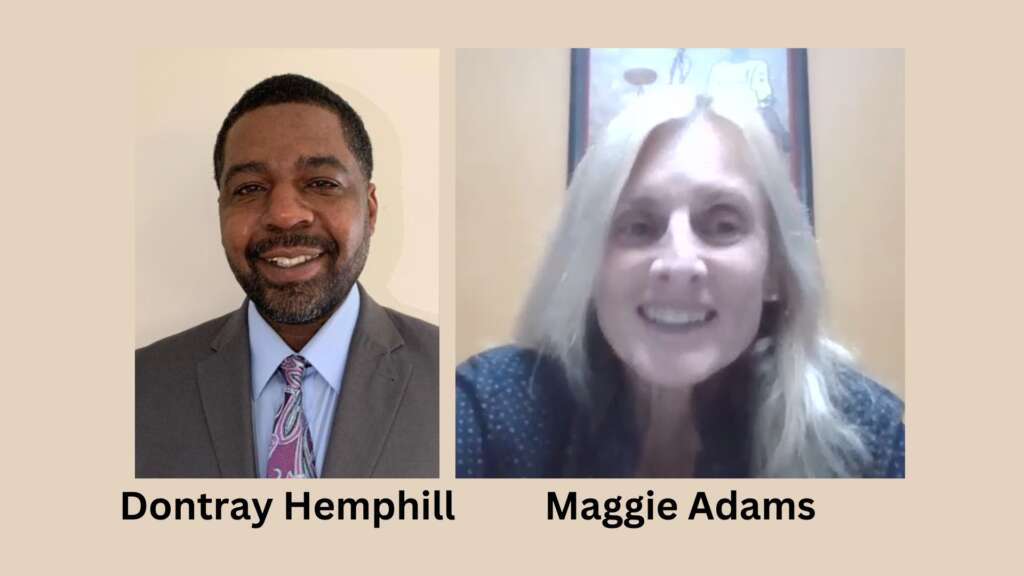 Rochelle Habeck & LaShana Jones, co-chairs
Rochelle Habeck & LaShana Jones, co-chairs
February was a very important, direction-setting month for our task force!
In the first two pictures, you see the lively discussion underway with members and partners (United Way, Learning Network, County Health & Community Services), and surprise visitor Dr. Warfield, President of our metropolitan NAACP. We heard reports from our interviews with more community EC&E program leaders (Community Healing Center, the County’s Maternal and Infant Health home visiting programs), from Michigan Power to Thrive, from a state hearing on child care convened by our Great Start Collaborative/KRESA, and a review of Michigan’s Children’s advocacy priorities. We supported Mothers of Hope’s effort in collecting signatures for placing a proposal on the November ballot that, if passed, would provide hourly workers with the right to earn paid sick time for personal or family health needs, for purposes related to domestic violence or sexual assault, and for school meetings related to a child’s disability or health. Workers would earn 1 hr. of sick time for every 30 hrs. worked. (See http://mitimetocare.org).
The major item of business was to select the issue area that our task force will address for policy advocacy. Each member was invited to present their nominated issue for the Task Force’s work, based on our research in the community. A clear majority spoke for dealing with the provision of Trauma-Informed Care (Services) and Education, related to the chronic stresses resulting from living in poverty and racism. Trauma-informed care/education involves recognizing the impact of living in these conditions on the behavior of children and their families and responding in ways that engage them successfully and help empower them in the process, rather than punitive reactions that lead to expulsion or drop out from care and education. Compelling stories were shared by members about two children who are growing up in these conditions – one who has dropped out of high quality child care and one who was eventually saved by a supportive community and is now succeeding in school.
The other issue with several nominations was advocating for increased financial support to provide more access to evidence-based early intervention for children ages 0-3 and their parents (e.g., PAT, Early On) and high quality child care. We discussed how these two issues could be tied together.
In the third picture, you see the 3rd meeting of the Community Discussion to Build a Local Early Childhood Policy Agenda convened by the Raising Kalamazoo County partners at the County Health & Community Services building. Representatives from many partner organizations and programs, including representatives from CTAC and the Governor’s Office, along with community members participated in a very active process to select the priority for the policy agenda from issues nominated at the last meeting. Again, there was strong and clear consensus for the early childhood and education community to come together and accomplish the adoption and implementation of a comprehensive and coordinated trauma-informed system of care/services and education for children and their families in our county. Many participants are already implementing these practices and conducting education with their staff. The goal is for this group to help identify best practices and training resources and develop and carry out strategies to advocate for comprehensive and coordinated adoption and implementation of these methods across systems of care and education in our county.
The Michigan Power to Thrive (MPTT) network has also selected this issue for advocacy and action as one way to address the school to prison pipeline. A Summit is scheduled in Lansing for April 5th. The goal is to achieve policy that would prevent young children being expelled from early care and preschool environments. These typically arise from lack of staff training and resources to recognize and address the social-emotional needs of children, especially relating to chronic stress and trauma.
 ISAAC
ISAAC





 Ed Genesis is an artist, poet, musician, organizer, entrepreneur, and community leader. Born and raised in Gary, Indiana and moved to Kalamazoo, Michigan permanently in his early 20’s, his love of art/music, his passion for his people and community, and his gift of creativity are evident in all areas of his work. In October 2018 Ed Genesis released a song to accompany the campaign he was working on around school push out, entitled Junior High, which was distributed nationwide including on his own iHeart radio station, Spotify, and iTunes.
Ed Genesis is an artist, poet, musician, organizer, entrepreneur, and community leader. Born and raised in Gary, Indiana and moved to Kalamazoo, Michigan permanently in his early 20’s, his love of art/music, his passion for his people and community, and his gift of creativity are evident in all areas of his work. In October 2018 Ed Genesis released a song to accompany the campaign he was working on around school push out, entitled Junior High, which was distributed nationwide including on his own iHeart radio station, Spotify, and iTunes.